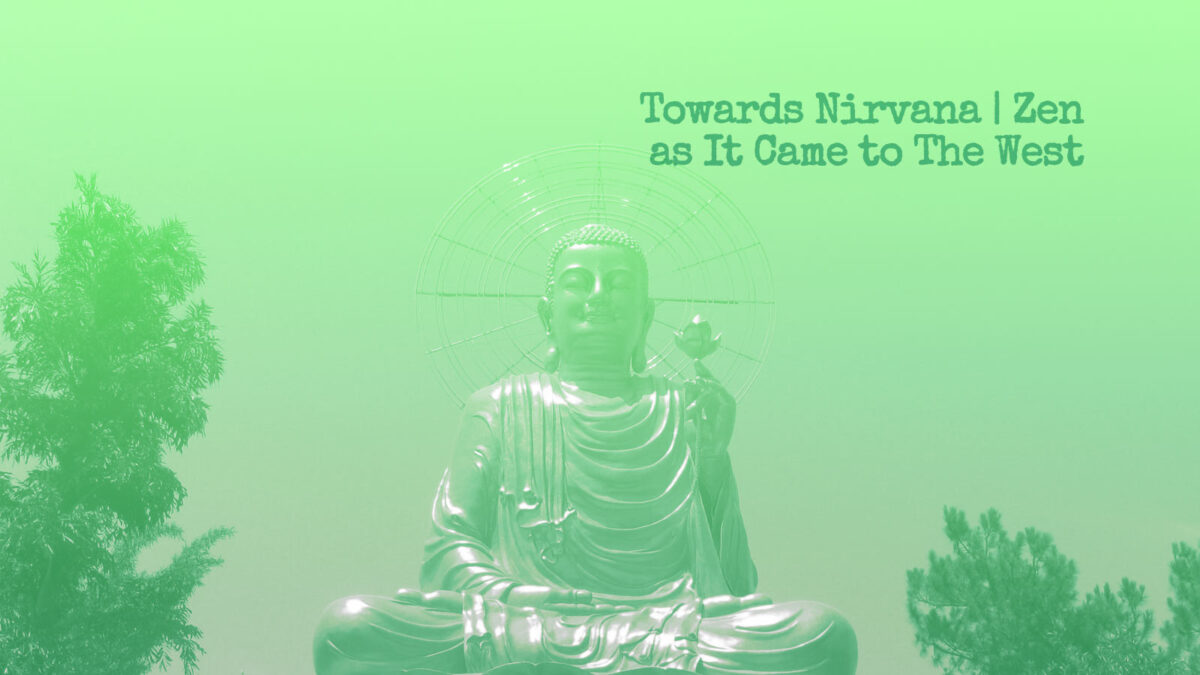To pursue a Zen Mind is to pursue a meaningful life through simplistic forms of mental practice. The Zen mind sees beauty in all existence, disregarding dualistic annotations of good and bad, positive and negative. By narrowing one’s focus on a specific practice using a beginner’s mindset, Zen can purify one’s mind leaving it unbothered by the troubles of life. Practicing Zen though an art or meditation such as zazen, is outward exercise of inward control and organization. By centering the self through Zen practice, the beauty of all things is unveiled, for the observer accepts their true nature. The goal of Zen is to liberate one’s self from the confines of the fettered and attached life, leaving an individual in a state of mind where being is equal to not being, while detached, yet fully involved in the world surrounding us.
Herrigel chose to pursue the Zen mind through the art of archery. Though his instruction was focused around the traditional activity, much of it had little to do with actual technique. Instead, Herrigel’s master, over many years, taught him inner balance and control, which would, in turn, allow him to “loose the shot” correctly. “The hits on the target are only the outward proof and confirmation of your purposelessness at its highest, or your egolessness, your self-abandonment… the hits are only outward confirmation of inner events” (Herrigel 56).
Within Zen there exists no distinction between the condition of the self, the conditions of an individual’s actions, and the condition of those objects that surround him. One’s surroundings are a mirrored image of his/her inner being. Thus shown by Herrigel’s master: a completed shot is the product of an archer immersed within himself. “When you do something, if you fix your mind on the activity with some confidence, the quality of your state of mind is the activity itself. When you are concentrated on the quality of your being, you are prepared for the activity” (Suzuki 104). Suzuki further explains this concept through the act of sitting: If one sits while his mind is in chaos, the calm act of sitting becomes chaotic itself. The serenity of sitting is only accomplished when the mind itself becomes clear and tranquil.
The Zen mind offers freedom from influences outside of the self such as wanton desires that have the power to compel and control. As one becomes enlightened to a state of egolessness and self-engagement, their focus and energy is no longer compromised by “subsidiary aims” (Herrigel 5), for they are wholeheartedly invested in themselves and the present circumstances that engulf them. A true understanding can be achieved when the self connects with the self in a relationship initially unconcerned with anything else. For when this is accomplished, “you see things as they are, and you become one with your surroundings” (Suzuki 80). As Herrigel learned that an authentic shot is a reflection of the archer’s mindset, Suzuki explains how a true understanding of one’s surroundings is the product of a mind that understands itself.
The “Single minded way,” embraced by the Bodhisattva, is also an aspect of Zen practice that offers liberation from the bothers of external influence. This mindset views the journey of life as a railway track that “is always the same. Wherever you go, the railway track is always the same” (Suzuki 54). Suzuki goes on to explain that despite the constant change of landscape that the railway may pass through, it must remain statically the same, for “If it were to become wider or narrower, it would be disastrous” (Suzuki 54). “Sincerity itself is the railway track” (Suzuki 54), and must be of unwavering devotion to the self. This practice of inward honesty will in turn offer the fruits of a content life, untroubled by external concerns.
By living through an honest demeanor of static sincerity, an individual’s actions become focused and wholehearted. This has much to do with the letting go of the ego, and embracing and egoless mindset. The subsidiary aims that often convolute our ambitions, referred to by Suzuki as “traces and notions,” have the power to detract our attention and “make our minds very complicated” (Suzuki 62).
“Most people have a double or triple notion in one activity. There is a saying, ‘To catch two birds with one stone.’ That is what people usually try to do. Because they want to catch too many birds they find it difficult to be concentrated on one activity, and they may end up not catching any birds at all! That kind of thinking always leaves its shadow on their activity” (Suzuki 62).
As the practice of static honesty employs self-justification, which frees the mind, honesty and integrity in our actions, leads to clarity of the mind. Action, in turn, is simply the means to an end, which is the purpose specific to the action completed. “It is necessary to remember what we have done, but we should not become attached to what we have done in some special sense” (Suzuki 63). The purpose behind giving one’s energy to an activity is no longer of selfish origin, if the nature of the engagement is wholehearted and detached from influence outside of the self.
These various forms of Zen mental practice, aim to center the individual. As Herrigel learned over many years to correctly shoot an arrow by striking a personal balance within him, Zen, and these few examples of mental practice likewise attempt to pinpoint the balance of the self, resulting in the balance of the environment in which we live. The beauty our surroundings, even the beauty of things unbalanced is thus recognized. “The goal of our life’s effort is to reach the other shore, Nirvana. Prajna paramita, the true wisdom of life, is that in each step of the way, the other shore is actually reached. To reach the other shore with each step of the crossing is the way of true living” (Suzuki 65). Suzuki beautifully explains the core of Zen. Through Zen practice, each new moment of life is pure bliss predicated solely upon the mindset that life is concerned with very little other than the mental landscape, and natural environment that currently surrounds our being. This is the role of Zen.

